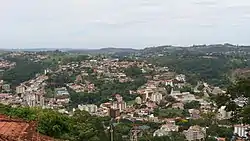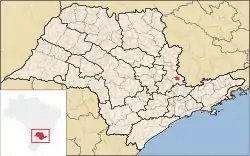Serra Negra
Serra Negra is a municipality in the state of São Paulo, Brazil. It belongs to the meso-region of Campinas. Population (2020) was 29,452 inhabitants. Total area: 203,5 km2, demographic density: 112 inhabitants/km2
Serra Negra | |
|---|---|
| Municipality of the Hydromineral Spa of Serra Negra | |
 A view of Serra Negra from the Morro do Mirante | |
 Flag  Coat of arms | |
| Motto: Virtvte Pavlistarvm Florvi (Latin for I flourish thanks to the valor of the people of São Paulo) | |
| Anthem: Serra Negra Meu Amor | |
 Location in the state of São Paulo | |
| Coordinates: 22°36′43″S 46°42′03″W | |
| Country | |
| Region | Southeast |
| State | |
| Founded | September 23, 1828 |
| Government | |
| • Mayor | Antônio Luigi Ítalo Franchi (DEM) |
| Area | |
| • Total | 203.01 km2 (78.38 sq mi) |
| Elevation | 925 m (3,035 ft) |
| Population (2020 [1]) | |
| • Total | 29,452 |
| • Density | 125.3/km2 (325/sq mi) |
| • Demonym | Serra-negrense |
| Time zone | UTC−3 (BRT) |
| Postal code | 13930-000 |
| Area code | 19 |
| HDI (2000) | 0.817 –high |
| Website | Serra Negra |
Location
The name of the city means black mountain range in the Portuguese language. It is located at an altitude of 925 m, in the Serra da Mantiqueira, a mountain range which runs mostly along the border of the state of São Paulo and Minas Gerais. It has a mild climate, being also a busy tourism spot, similarly to its close neighbours, the cities of Lindóia and Águas de Lindóia.
History
Serra Negra was founded on 23 September 1828, but at least a century before that the region was already inhabited and was on the passageway between São Paulo and Minas Gerais. It was elevated to the status of city on 21 April 1885. At the end of the 19th century, the region received a large influx of European immigrants, mostly Italians, who came to work on coffee farms. Mineral water sources were discovered by Luiz Rielli in 1928 and the city became a much sought-after spa town (it is known as the "City of Health").
Notable People
In 1962, war criminal and Nazi physician, Josef Mengele, also known as the Angel of Death purchased a coffee and cattle farm in Serra Negra with 2 of his associates Géza and Gitta Stammer, with Josef owning a half interest.[2]
Population history
| Year | Pop. | ±% |
|---|---|---|
| 2003 | 22,794 | — |
| 2004 | 24,953 | +9.5% |
References
- IBGE 2020
- Levy, Alan, February 21-2018 (2002). Nazi hunter : the Wiesenthal file. Alan, February 21-2018 Levy, Mazal Holocaust Collection. London: Robinson. pp. 279–281. ISBN 1-84119-607-X. OCLC 49905728.
{{cite book}}: CS1 maint: date and year (link) CS1 maint: multiple names: authors list (link)
External links
- (in Portuguese) Official site
- (in Portuguese) SerraNegra.Com
- (in Portuguese) hoteisdeserranegra.com.br